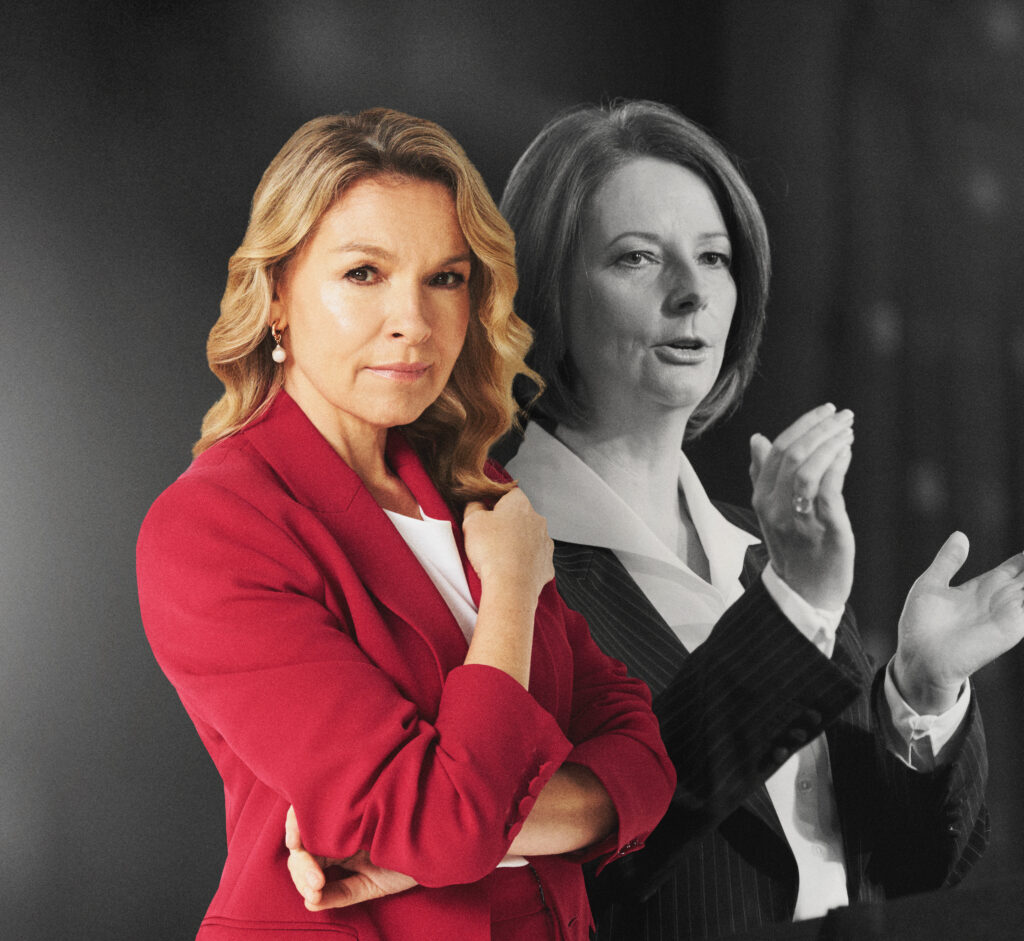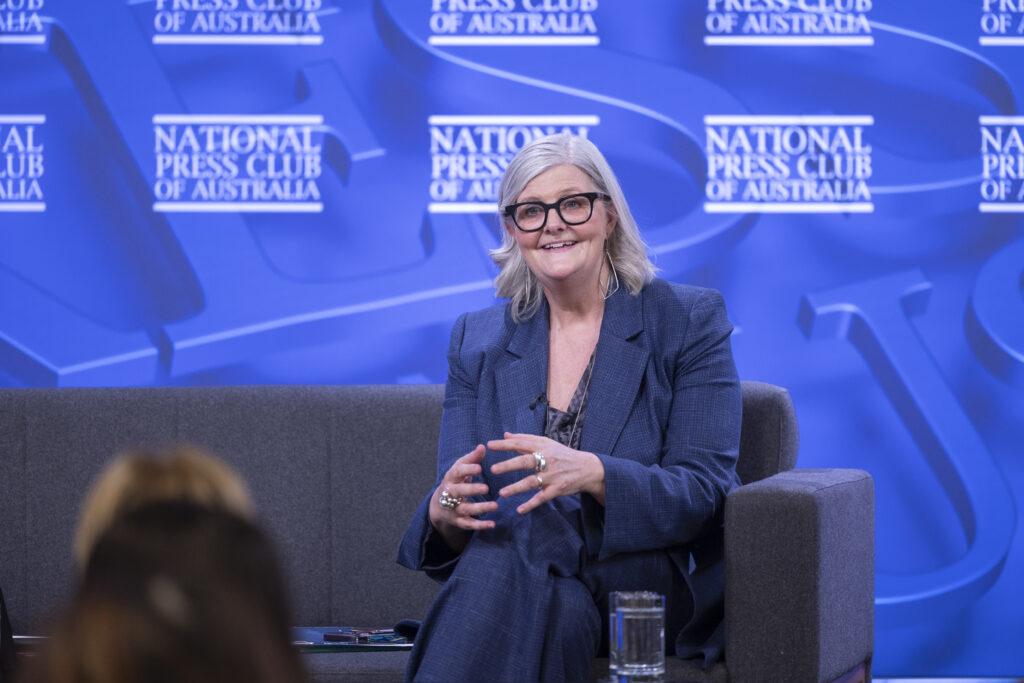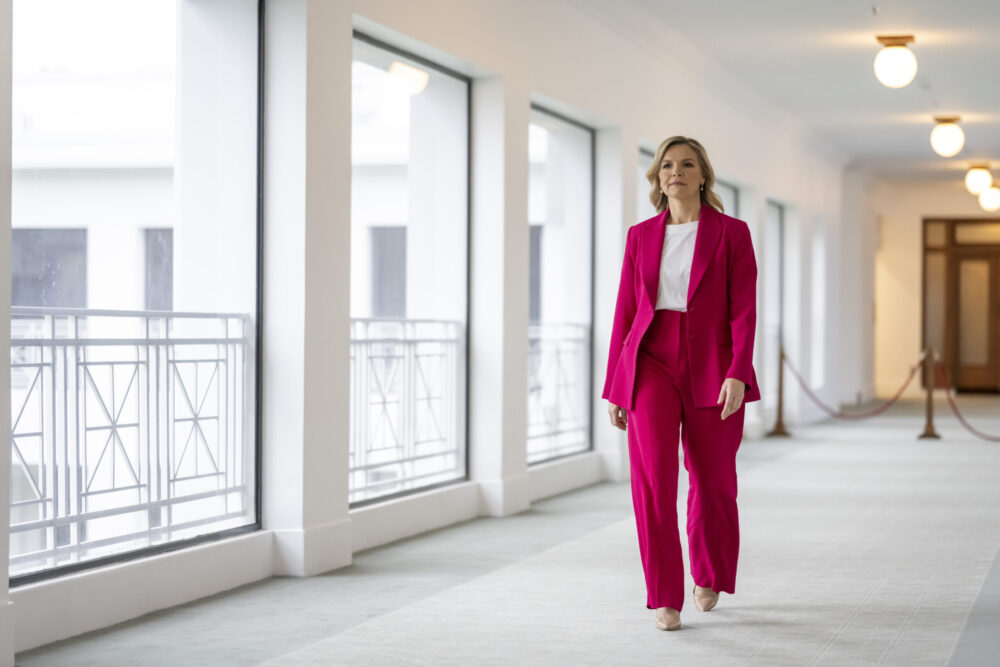This week I was one of the fortunate attendees at the World Premiere of Julia, at the Canberra Theatre Centre. The remarkable script about a remarkable life was given wings through an extraordinary performance.
The play received three standing ovations at the first show on Tuesday and three more on Thursday. Justine Clake and Jessica Bentley played the lead roles in Joanna Murray-Smith‘s incredible work. The subject of the production is the cultural wall of misogyny which threw itself at former Prime Minister Julia Gillard.
Even though we knew the ending already, or so we thought, Julia held us in thrilled suspense as it relived the days and years leading up to the “Not Now. Not Ever” speech.
It took an emotional toll watching the unfolding torrent of vile abuse hurtled at the PM. The production, directed by Sarah Goodes created a powerful wave of emotion which leapt off the script and was met by the audience when Clarke landed “the” speech. It dropped me back to the 2019 Women’s March in front of Parliament House. A similar welling up of outrage and inspiration generated by the courage of one women standing up and saying: “I. Will. Not”.
There was a pulsing hum at the play “Julia” that was similar in tone to March for Justice in March 2021 (where protestors in 40 Australian cities campaigned on issues of gendered harassment and assault).
It’s the intuitive rise in consciousness and energy sourced deep in shared experience between people realising they are among others who have also experienced pervasive devaluing of their humanity. There’s a euphoric liberation of being among your people. The rallying cry seems to be: “We Will Not”.

“Julia” is a new play by Joanna Murray-Smith in which Justine Clarke (Children of the Sun) embodies the life and career that led to former Prime Minister Julia Gillard’s ‘misogyny speech.’ Picture Martin Ollman/Museum of Australian Democracy
So why am I writing this? I’m not a theatre critic. Far from it. I direct, among other things, a program at University of Canberra which was inspired by the treatment of women in the political arena. Specifically, the lack of gender equality in political office, the sexist barriers which have maintained it and the appalling impact this inequality has on our community.
Our Pathways to Politics Program for Women, is a national, proudly non-partisan initiative that aims to change the face of politics by equipping women with the skills, knowledge, confidence and networks they need to run for elected office and thrive as political leaders. Dr Meredith Martin from University of Melbourne has previously written in BroadAgenda about the commencement of Pathways at University of Canberra.
In my view, Julia canvasses the myriad of reasons why is gender equality in political office is so. When women hold political leadership, it is good for democracy, for communities and results in better governance.
A report by Kings College which examined 500 pieces of research into the impacts of women leaders found:
- Women policy makers prioritise issues that benefit the most vulnerable in society, such as healthcare, welfare and education. As such, more women leaders seem to make for more equal and caring societies;
- Women may be more likely to focus on these issues because they have greater experience of deprivation, and because they are often responsible for caring for others;
- On average, women work harder than men to represent their constituencies, which is linked to a stronger sense among voters that government is responsive to their needs;
- Increased representation of women in elected office is associated with counteracting corruption and focusing resources on the quality and consistency of public service delivery;
- States where women hold more political power are less likely to go to war and less likely to commit human rights abuses;
- Women bring collaborative and inclusive leadership styles into political environments that are often characterised by division and one-upmanship.
These results are not surprising to those who have been fighting for more diversity, inclusion and equality at every decision making table. Without women, governments who are in the market for ideas will not understand the gendered impact of their choices, or worse, may choose solutions steeped in misogyny.
The terrible impacts of sexist policy, such as Robodebt, become obvious when we listen to the voices of people who were caught in its pernicious trap. The system design being revealed in the Robodebt Royal Commission started with a particular view about the people – mostly single women with children – who receive income support payments; that they are lazy, untrustworthy cheats.
Robodebt did exactly what those in the market looking for a solution to “the problem” wanted it to do. It treated people like lazy liars who steal from the system and it punished them.

Sam Mostyn, Australian businesswoman and climate change and gender equity advocate, speaking at the National Press Club. Picture: Hilary Wardhaugh
On 9 March the Chair of the Women’s Economic Equality Taskforce, Sam Mostyn delivered an address at the National Press Club outlining the Taskforce’s recommendations. This group of women brought a spectrum of expertise to their year of listening to women share their lived experiences of what is holding them back and what needs to be done.
Mostyn’s speech as always, was so reasonable in its delivery that it was irresistible. She landed a beautifully righteous feminist agenda which was both compelling and full of grace.
“The starting point” she said, “is the vital importance of women….We know what needs to be done and what is utterly essential to lift women out of poverty”.
“The challenge” she said, is: “Do we, as a nation have the courage to act?” Mostyn issued a personal challenge to all of us: “Do you care and what are you prepared to do?”
Programs like Pathways to Politics is rising to that call. Pathways is delivering change which, like the metaphorical flowers in Julia, are growing, literally before our eyes. There are now over 350 graduates of the program who will be joined by over 130 each year with the national expansion.
In just a few years, alum have achieved electoral successes at every level with more standing at every election. We are creating a network of women who are skilled up, connected, collegiate and energised. It is putting more women, especially those who also bring diversity in their economic background, race and sexuality at decision making tables where they have previously been absent or alone.
Women in numbers, change the narrative. When the marketplace of ideas includes women’s experience, we change the direction and focus. The evidence is that women decision makers bring their experience as care givers, of living in poverty and of fighting the tide of sexism into their policy making.
Would a diverse group of women have started from the view that income support recipients are unworthy? Would they have purchased a solution which treated people like criminals? Not Now. Not Ever.
“Sexism is boring,” said Clarke. That line in Julia sums it up. Indeed sexism is boring. It’s also hurting us and holding us back. We all deserve better. As Mostyn recounted in her speech, “gender equality should be as normal as drinking water.” Achieving gender equality in political office is vital to all of our futures and it will require women in numbers to make and secure long term change. We must be at every decision making table.
- Picture at top: “Julia” is a new play by Joanna Murray-Smith in which Justine Clarke (Children of the Sun) embodies the life and career that led to former Prime Minister Julia Gillard’s ‘misogyny speech.’ Picture Martin Ollman/Museum of Australian Democracy
Amy Kilpatrick is director of the 50/50 by 2030 Foundation at University of Canberra. She's a skilled law reformer, public speaker and researcher with a specialty in the management of high-conflict personalities in the workplace and in litigation.





